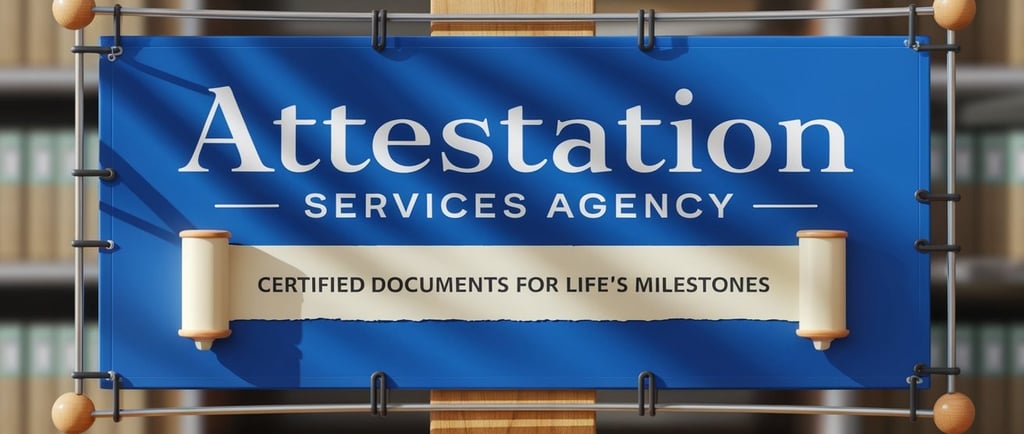Understanding Certificate Attestation: What It Is and Why You Need It
Certificate attestation is the process of verifying the authenticity of documents—such as educational degrees, birth certificates, or marriage certificates—so they’re officially recognized in another country. It’s required when you're applying for a visa, pursuing education, getting a job, or settling abroad.
7/5/20254 min read


What is Certificate Attestation?
Certificate attestation is a crucial process that validates the authenticity of various documents, ensuring that they are recognized and accepted internationally. This verification process plays a significant role, especially for individuals looking to pursue education, employment, or residency opportunities abroad. In essence, certificate attestation provides a level of trust and credibility to personal, educational, and professional documents.
The process of attestation involves several stages, starting from the document verification by the relevant authorities in the country of origin. For educational documents, for instance, this typically includes degrees, diplomas, and transcripts. These are verified by educational institutions and subsequently attested by governmental departments, such as the Ministry of Education and the Ministry of External Affairs in India. Such verification confirms the legitimacy of the documents presented, thereby minimizing fraudulent claims.
Similarly, personal documents such as birth certificates, marriage certificates, and divorce decrees undergo a rigorous validation process. These documents are often required for various legal and administrative purposes in foreign countries, thus necessitating attestation by local government bodies. Professional documents, including employment letters and experience certificates, also require verification to ensure that the individual's professional background is accurately represented.
Furthermore, different countries have their own specific requirements and procedures for certificate attestation. For example, the documents intended for use in the Gulf countries may require an additional level of authentication by the respective embassies or consulates. This variability emphasizes the importance of understanding the attestation process tailored to the intended destination.
In conclusion, certificate attestation is a vital step for individuals seeking to validate their documents for international use. By ensuring that personal, educational, and professional credentials are verified, certificate attestation facilitates smoother transitions across borders and enhances the reliability of one’s credentials in a global perspective.
Why Certificate Attestation is Required?
Certificate attestation is a critical process that validates the authenticity of academic and professional documents for individuals intending to work, study, or relocate abroad. The necessity for certificate attestation arises from varying regulations imposed by different countries, which often stipulate that foreign documents must be verified before they are considered valid for legal and administrative procedures within their borders. This requirement underscores the importance of ensuring that the submitted documents reflect genuine qualifications and experiences.
Each country has its own set of requirements regarding document attestation. For instance, many nations require attested certificates for visa applications, educational admissibility assessments, and job placements. The absence of attested documents can lead to issues such as visa refusals, non-acceptance in educational institutions, or disqualification from job opportunities. Therefore, understanding the specific attestation requirements of the target country is imperative, as these vary significantly.
Moreover, the verification of documents through attestation serves to bolster the credibility of individuals in the eyes of foreign governments and institutions. Attestation assures authorities that the presented qualifications are legitimate and have been issued by recognized educational or professional bodies. This validation not only facilitates the process of acquiring visas and securing jobs but also protects individuals from potential legal repercussions regarding fraud or misrepresentation.
In a globalized world, where mobility for education and employment is increasingly common, the role of certificate attestation has become more significant than ever. It acts as a bridge that connects individuals with opportunities beyond their homeland, ensuring that their qualifications are respected and recognized across borders. As such, obtaining attested documents is not just advised; it is often a pivotal requirement for anyone looking to thrive in an international setting.
The Process of Certificate Attestation
Certificate attestation is a systematic process that ensures the authenticity of various documents for use in foreign jurisdictions. The steps involved in this process typically start with obtaining an original document that requires attestation. This could include educational certificates, marriage certificates, or any other legal documents. Once the original document is in hand, the first step is to approach a notary public or local authority to get a preliminary verification. The notary will verify the authenticity of the document and may affix an official seal or signature, confirming that the document originates from a credible source.
Following notarization, the document must be submitted to relevant government authorities, which vary depending on the type of document and its destination country. For example, educational certificates are usually sent to the Ministry of Education for validation before being forwarded to the Ministry of External Affairs (MEA). The MEA’s role is crucial, as it serves as an intermediary between the individual and the respective embassy or consulate.
Once the document has been authenticated by the MEA, it is then taken to the embassy or consulate of the country where the document will be used. The embassy will perform its own verification to ensure that the document meets their regulations. It is important to note that the requirements for attestation can differ significantly between countries, which may lead to varying timelines and costs. It is advisable to check the specific requirements on the embassy's website or contact them directly.
In addition to understanding the procedural steps, applicants should also anticipate possible challenges such as delays due to holidays, incomplete documentation, or miscommunication with authorities. Preparing well in advance and ensuring all documentation is complete can greatly streamline the process. By being informed about the roles of involved entities and the typical timeline for certificate attestation, individuals can effectively navigate this essential procedure with greater ease.
Conclusion: Ensuring Your Documents are Ready for International Pursuits
As we have explored throughout this blog post, certificate attestation plays a pivotal role in facilitating international endeavors, whether they are academic or professional in nature. The process of attesting your documents is crucial for validating the authenticity of qualifications and credentials when these are presented to foreign authorities. It establishes trust and ensures that the documents meet the legal requirements of the destination country.
Preparation is key when it comes to certificate attestation. By understanding the specific requirements of the country to which you are applying, you can ensure that your documents are appropriately authenticated. This involves not only acquiring the necessary attestations from relevant agencies but also being aware of the timeframes involved and possible fees. Careful and proactive planning helps in mitigating delays that could arise from incomplete documentation or misunderstandings regarding the attestation process.
The importance of certificate attestation cannot be overstated. It acts as a bridge that connects individuals to international opportunities, enabling them to pursue education, employment, and residency abroad. Moreover, with the increasing globalization of the workforce, many sectors are recognizing international qualifications, thus making it imperative for professionals to ensure that their educational and experience documents are correctly attested.
In summary, to maximize your chances of success in international pursuits, it is essential to prepare and attestation of your documents thoroughly. By doing so, you will not only comply with legal mandates but also present a strong case for your qualifications to foreign employers and educational institutions. Ultimately, proper certificate attestation can significantly enhance your prospects in a globalized world.
